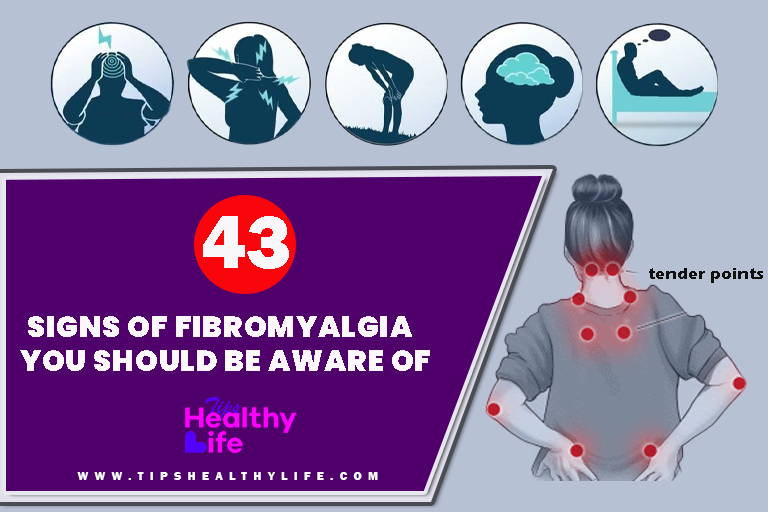Introduction
Fibromyalgia is one of the most misunderstood and often misdiagnosed chronic conditions in the world. It’s not “just in your head.” It’s a real, complex disorder that affects the entire body — muscles, nerves, energy levels, sleep, and even emotions.
Recognizing the early signs of fibromyalgia can make a huge difference in how quickly you get help and start managing your symptoms effectively. Many people spend years searching for answers before receiving a diagnosis. To make that journey easier, here are 43 common signs of fibromyalgia that everyone should be aware of.

🩶 1. Widespread Body Pain
The most defining symptom of fibromyalgia is chronic pain that spreads throughout the body. It often feels like a deep ache or burning sensation that moves from one area to another.
2. Morning Stiffness
Muscles and joints often feel tight or sore after waking up, similar to having the flu.
3. Fatigue That Never Goes Away
Even after a full night’s sleep, many people with fibromyalgia feel exhausted all day long.
4. Sleep Disturbances
Restless sleep, vivid dreams, and frequent awakenings are very common, leaving you feeling unrefreshed.
5. Brain Fog (Fibro Fog)
Trouble concentrating, forgetfulness, or difficulty finding words — all part of the mental fatigue caused by fibromyalgia.
6. Headaches or Migraines
Recurring tension headaches or migraines often accompany the condition, triggered by stress or lack of rest.
7. Sensitivity to Touch
Even a gentle hug or light pressure can cause pain or discomfort.
8. Sensitivity to Noise and Light
Bright lights or loud sounds can quickly overwhelm your senses.
9. Muscle Spasms
Sudden cramps or muscle twitches often occur, especially during stress or fatigue.
10. Tingling or Numbness
Pins-and-needles sensations in hands, feet, or face can be signs of nerve involvement.
11. Chronic Neck and Shoulder Pain
These are common tender points that worsen after physical or emotional stress.
12. Lower Back Pain
Persistent back pain that doesn’t improve with rest or medication can signal fibromyalgia.
13. Chest Pain
Many patients describe chest pain similar to heart discomfort, known as costochondritis, caused by inflammation of the rib cartilage.
14. Abdominal Pain or IBS
Irritable bowel syndrome (IBS) affects nearly half of fibromyalgia patients, leading to bloating, constipation, or diarrhea.
15. Frequent Urination
Bladder pain or frequent urges to urinate, often mistaken for urinary tract infections.
16. Dry Eyes and Mouth
Many with fibromyalgia experience dryness, similar to Sjögren’s syndrome.
17. Anxiety and Panic Attacks
The constant physical strain and unpredictability of pain can trigger anxiety.
18. Depression
Persistent pain and fatigue can deeply affect mood, leading to feelings of hopelessness or sadness.
19. Dizziness or Lightheadedness
A sudden drop in blood pressure when standing up can cause dizziness, known as orthostatic intolerance.
20. Balance Problems
Many experience clumsiness or a feeling of instability while walking.
21. Restless Legs Syndrome
An irresistible urge to move your legs at night, making sleep difficult.
22. Numb Hands While Sleeping
Hands may fall asleep or feel tingly due to poor circulation or nerve compression.
23. Temperature Sensitivity
You might feel too hot or too cold when others are comfortable.
24. Skin Sensitivity
The skin may feel sore or easily irritated by touch, fabrics, or lotions.
25. Swelling Sensations
Some people feel their hands or feet are swollen, even when they look normal.
26. Unexplained Weight Changes
Both weight gain and weight loss can occur due to fatigue, inactivity, or hormonal imbalance.
27. Menstrual Pain
Women with fibromyalgia often experience intense period cramps and PMS.
28. Jaw Pain (TMJ Disorder)
Pain in the jaw joint, especially while chewing or talking, is common.
29. Vision Problems
Blurred vision or dry eyes may accompany flare-ups.
30. Allergies or Sensitivities
Heightened sensitivity to chemicals, perfumes, or medications.
31. Chest Tightness
Feeling pressure in the chest that mimics heart-related issues, but often linked to muscle pain.
32. Nausea or Dizziness After Meals
This can be due to digestive issues or nerve dysfunction.
33. Heart Palpitations
Feeling like your heart is racing or skipping beats, often triggered by stress.
34. Low Energy After Small Tasks
Even minor chores can feel like running a marathon.
35. Difficulty Handling Stress
Fibromyalgia patients are extremely sensitive to emotional or physical stress.
36. Memory Loss
Short-term memory lapses, such as forgetting why you entered a room.
37. Feeling Overwhelmed Easily
Loud environments, crowds, or multitasking can cause mental overload.
38. Itchy or Burning Skin
Some experience odd skin sensations without visible rashes.
39. Numb Lips or Face
Occasional facial numbness can mimic neurological disorders but is fibromyalgia-related.
40. Difficulty Breathing Deeply
A feeling of being unable to take a full breath due to chest wall tightness.
41. Sensation of Vibrations
Some patients report feeling like their body is “buzzing” inside — a neurological symptom.
42. Unexplained Bruising
Tender points can bruise easily, even from minor pressure.
43. Flare-Ups That Come and Go
Symptoms can vanish for weeks and suddenly return, triggered by stress, weather, or lack of rest.
💜 What to Do If You Recognize These Signs
If you recognize several of these signs, it’s essential to speak with a healthcare professional familiar with fibromyalgia. Early diagnosis helps you manage symptoms better and prevent flare-ups from dominating your life.
You don’t have to face fibromyalgia alone — lifestyle changes, gentle movement, a balanced diet, and emotional support can bring meaningful relief. Most importantly, be kind to yourself. Healing begins when you listen to your body with compassion.




